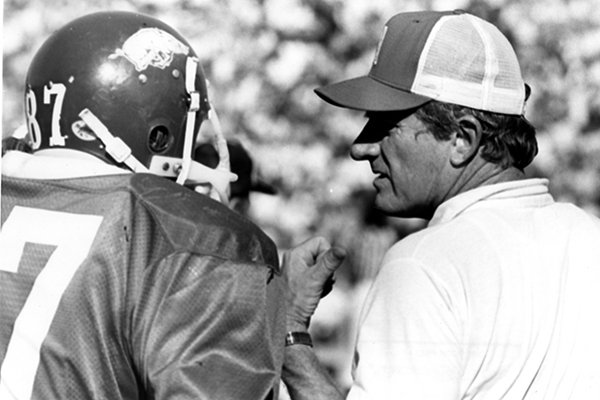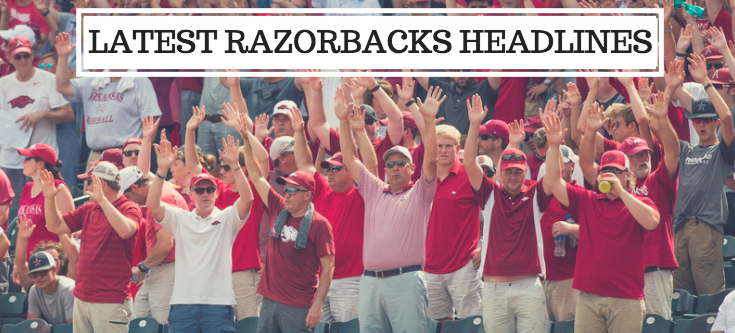FAYETTEVILLE -- A few months after being hired by Arkansas Razorbacks Coach Frank Broyles as the team's linebackers coach, Harold Horton found himself in Green Bay, Wis., in July 1968.
Horton was sitting in an office at Lambeau Field along with Broyles and Razorbacks offensive line coach Merv Johnson while watching Vince Lombardi diagram plays on a blackboard.
Lombardi had stepped down as the Green Bay Packers' coach the previous season -- but remained as general manager -- after leading them to a third consecutive NFL championship and fifth in a seven-year span.
"It was obvious Lombardi still loved coaching," Horton said Tuesday. "He talked enthusiastically to us and diagrammed plays for two hours."
Click here for larger versions
Photos by Arkansas Democrat-Gazette
Photos by Arkansas Democrat-Gazette
LOOKING BACK: Coverage of Broyles' 1957 hiring at UA

Broyles was going into his 11th season of what would become a 19-year tenure as the University of Arkansas, Fayetteville head coach.
The Razorbacks were coming off a 4-5-1 season in 1967 -- their first losing record since Broyles' first season when they went 4-6 in 1958 -- and Broyles was looking for an edge to get the program back on track.
"Coach Broyles sat there quietly the whole time listening to Lombardi and took in everything he could," Horton said. "He was always trying to learn more.
"He wanted to stay on top of what was going on in the game. He wanted to know the latest information.
"Coach Broyles also was feeling some pressure after that '67 season -- we all were -- and he was determined to make sure Arkansas was winning again."
Broyles, who died Monday at age 92, had the reputation of being a CEO coach, and Horton said he did delegate a lot of responsibility to his assistants.
"But Coach Broyles was a great coach, too," Horton said. "He really knew his X's and O's."
Broyles led the Razorbacks to a 144-58-5 record from 1958-1976 before stepping down to focus on his duties as athletic director.
Horton said no Arkansas coach since Broyles could outcoach him.
"People may look at Lou Holtz and Bobby Petrino, Ken Hatfield and Houston Nutt all as being better coaches on the field than Coach Broyles because he didn't call the plays, but that's not true," Horton said. "Coach Broyles had a great football mind. He studied the game, and he made us study the game."
After the visit to Green Bay with Lombardi -- who returned to coaching with the Washington Redskins in 1969 but died from colon cancer before the 1970 season -- Broyles led Arkansas to records of 10-1 in 1968, 9-2 in 1969 and 9-2 in 1970.
Horton said Broyles and the assistant coaches also visited the Kansas City Chiefs and Pittsburgh Steelers, and they often visited with staffs at other colleges.
"Yes, Coach Broyles was a great athletic director, but he was a great coach, too," Horton said. "He was a strong fundamental coach. He believed in blocking and tackling and executing your first step. He broke everything down to a fine point."
Horton actually met Broyles a few days before Broyles was hired at Arkansas on Dec. 7, 1957, after leading Missouri to a 5-4-1 record in his only previous season as a head coach.
Evidence that coaching searches were far less secretive 60 years ago, Horton -- who had just completed his freshman season with the Razorbacks -- recalled he was playing a pickup basketball game with some teammates in Barnhill Arena when Broyles came by looking at the UA's facilities as part of his job interview.
Arkansas was looking to replace Jack Mitchell, who had resigned to take the Kansas job.
"We all knew Coach Broyles was a potential coach for us," Horton said. "I think he came over and introduced himself and talked to us for a few minutes."
Broyles led Arkansas to three consecutive Southwest Conference titles from 1959-1961, but he got off to a rough start in 1958 as the Razorbacks lost their first six games.
Horton, who played defensive back and running back, redshirted in 1958 and played on the scout team.
"It was a difficult time to be on the scout team," Horton said. "The varsity worked on tackling and fundamentals and did it full speed. Us scout-teamers took a beating."
The Razorbacks won their final four games in 1958 to set the stage for Broyles' run of success leading the program.
"As players we all had a lot of respect for Coach Broyles because he was always so positive," Horton said. "He didn't holler and scream at us. He didn't use bad language. He talked to us. But, at the same time, he knew when to put the hammer down if things weren't going the way he wanted."
Horton said Broyles didn't spent a lot of time with the players -- except for the quarterbacks -- unless he talked to them after practice or during a team meeting.
"Coach Broyles coached the assistant coaches," Horton said. "Then the assistants coached us."
Horton's assistant coaches were Doug Dickey (defensive backs) and Hayden Fry (offensive backs), who both became head coaches and were inducted into the College Football Hall of Fame along with Broyles.
Dickey had a 104-58-6 record at Tennessee and Florida. Fry had a 232-178-10 record at SMU, North Texas and Iowa, where he coached Arkansas Coach Bret Bielema.
When Horton was an assistant coach at Arkansas, he was on staffs that included Joe Gibbs, Jimmy Johnson and Raymond Barry.
Gibbs won three Super Bowls as coach of the Washington Redskins; Johnson won two Super Bowls as coach of the Dallas Cowboys; and Berry coached the New England Patriots to a Super Bowl appearance.
Horton later became head coach of the University of Central Arkansas and led the Bears to a 74-12-5 record and two NAIA championships.
"It was incredible the assistants Coach Broyles hired," Horton said. "I learned so much playing for and coaching with those other assistants."
Horton said a key to Broyles being Arkansas' coach and athletic director for 50 years was the relationships he built with fans, which began with driving around the state with assistant coach Wilson Matthews during the offseason.
"When Coach Broyles first came to Arkansas, to help tie the state together, he and coach Matthews would drive to Eudora or Lake Village and have a Razorback Club meeting," Horton said. "Then they'd go to McGehee, go to Stuttgart, go to Helena or Forrest City.
"Coach Broyles might have breakfast with some people, then there was a good chance he'd play golf in the afternoon with a group, and then he'd speak to a meeting at night.
"It wasn't a fly-in and a fly-out deal. He got to know the people of Arkansas and they got to know him. His feeling was, if he's going to ask them to come to Fayetteville to watch the Razorbacks play, he needed to go to their area so he could be a part of their community."
Horton recalled being on a road trip with Broyles in Forrest City when he got a call from a former teammate at Georgia Tech.
"I don't remember the exact year, but his teammate was now on the Georgia Tech board of trustees," Horton said. "He called to offer Coach Broyles the Georgia Tech coaching job, and it was for substantial pay.
"But Coach Broyles told him right then and there he wasn't interested in a job, that he was happy at Arkansas.
"Coach Broyles didn't use that offer to go out and better his situation here at Arkansas, either. This is where he wanted to end his career."
After Horton played and coached for Broyles, he returned to Arkansas in an administrative role, first as a recruiting coordinator and then as an executive at the Razorback Foundation.
Horton survived several coaching changes.
"I remember Coach Broyles telling me not to worry about anything, that I had a job here as long as he was here," said Horton, who retired from the Razorback Foundation in 2012. "I just appreciate everything he's done for me.
"Not only was he so big for the University of Arkansas and the state of Arkansas, but he helped me and so many other former players. All it would take is for someone to call him and he'd do whatever he could to help."
Horton said Broyles' former players showed their devotion to him by how many visited him in recent days as news spread that he was about to succumb to Alzheimer's disease.
Among the former players Horton took to visit Broyles were Bo Busby, a doctor in Little Rock, and Barry Switzer, who coached Oklahoma to three national championships and led Dallas to a Super Bowl title after replacing Johnson.
Busby was a senior in 1976. Switzer was a senior in 1959 and coached for Broyles in 1964-1965.
"When we walked into the house, Bo went up to Coach Broyles and said, 'Coach, I'm Bo Busby,' " Horton said. "Coach Broyles raised his arm real slow and pointed at him and said, 'No. 17.' That was Bo's number.
"Barry went up to him and said, 'Coach, Barry Switzer. I love you, Coach.' And Coach Broyles said, 'Barry, I love you, too.' "
While Switzer raised the Lombardi Trophy as a winning Super Bowl coach along with Gibbs and Johnson, Broyles got to watch Vince Lombardi diagram plays and listen to him talk about the Packers' power sweep.
Sports on 08/16/2017

